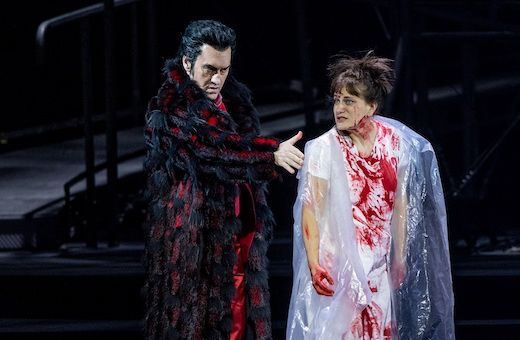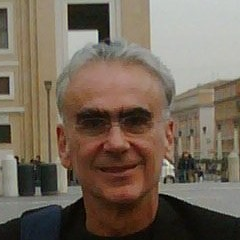Arrigo Boito meant to give the devil his due in Mefistofele by casting him in the central role. But Balázs Kovalik’s opulent staging at the Hungarian State Opera means that Satan must struggle not only against God, but at least occasionally for the attention of the audience. The reason? The stage magic of Kovalik and his crew occasionally threatens to overwhelm the principals. But in a good way. Because only a visually compelling production such as revived in Budapest can distract from a story that is stiff and stilted with jarringly little transition from one set scene to the other. And musically, the welcome Wagnerian growls or passages akin to Verdi’s easy grandeur only heighten the lack of energy that characterises much of this work.

Kovalik’s production is based on the one he first created 12 years ago. But the newly refurbished State Opera stage gives him the leeway that he did not have in 2010 to endow the action with vibrancy as compelling as Faust’s transformation from bent-backed whitebeard to vigorous youth in Goethe’s source work. The modern stage mechanics were installed as part of a nearly five-year refurbishment of the historic opera house that was completed just last month, and Kovalik makes good use of the flying systems, revolving platforms, slip stages, stage elevators, and motorised rigging hidden in the fly loft to work his visual magic. Angels seem to float in mid-air next to mortals in translucent balloons representing the constraints of their existence. The chorus is everywhere, sometimes at front stage, at others high above the rest of the action on the raised platforms of both wings. The metal spiral staircase that dominates centre-stage is at once a handy prop for the principals to enter or withdraw and, at the same time, a DNA spiral depicting the mystery of life. Blues and violets dominate the lighting – and reds, of course, as befits an opera where Beelzebub is king.
All this is well and good. But the emphasis on the visuals evokes at least some sympathy for the Devil. After all, while Boito meant to give him centre-stage, Mefistofele faces a formidable challenge for audience attention in this production from set designer Csaba Antal’s well-executed ideas. Smokers light up when nervous, and so did Rubén Amoretti, the evening’s Mefistofele. Repeatedly. But it turned out to be just a bad habit of the many the devil is bound to have and not a case of nerves jangled by fear that he would not be able to assert himself. This is a showcase role for a bass, and Amoretti tackled it with formidable range and power, but with versatility as well. The menacing voice that so well expressed the Devil’s contempt for mankind in “Ecco il mondo”, Mefistofele’s signature aria, was turned with admirable facility into near buffo in the airy and light flirtation scene with Marta, Margherita’s neighbour, later in Act 2. And his donning of the EU flag as a cloak during the Witches Sabbath was a nice touch in a member country whose government frequently stops just short of equating the European Union with the Devil.
Gabriella Létay Kiss shone as Margherita, the simple peasant girl seduced by Faust who gains salvation despite her perdition. It’s unfortunate that Boito assigned so few solo showpieces to the role because Kiss’s vocal range and strength seemed almost under-utilised. “L’altra notte”, the aria that opens her mad scene, was delivered with dramatic intensity and the kind of soaring emotion that made it one of the evening’s musical highlights. With this kind of singing, she made her less demanding other role as Elena, Queen of Troy, look more than easy.
Cosmin Ifrin was Faust, substituting for the ill-disposed Sung Kyu Park. At first unsure on his high notes, he improved as the evening went on with the help of a hand over his right ear to focus on his pitch. Gergely Boncsér as Wagner, Faust’s assistant, and Anna Csenge Fürjes as Marta and Pantalis, Helen’s companion, were well cast, and the crowd scenes enthusiastically sung and played by the State Opera Chorus and Children’s Chorus. With musicians both on stage and in the pit, conductor Antonello Allemandi struggled occasionally with the cues. But the majestic Prologue unfolded with raw power under his baton, and he was in full control of the pacing of this occasionally fragmented piece.
Boito was Verdi’s librettist for Macbeth and Otello. But the Italian master gave a mixed review of this opera, saying Boito was only able to “more or less succeed with it,” while George Bernard Shaw called Boito “an accomplished literary man without original musical gifts.” They might have been kinder had they seen it supported by the visual excitement of Kovalik's production.


